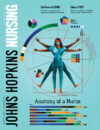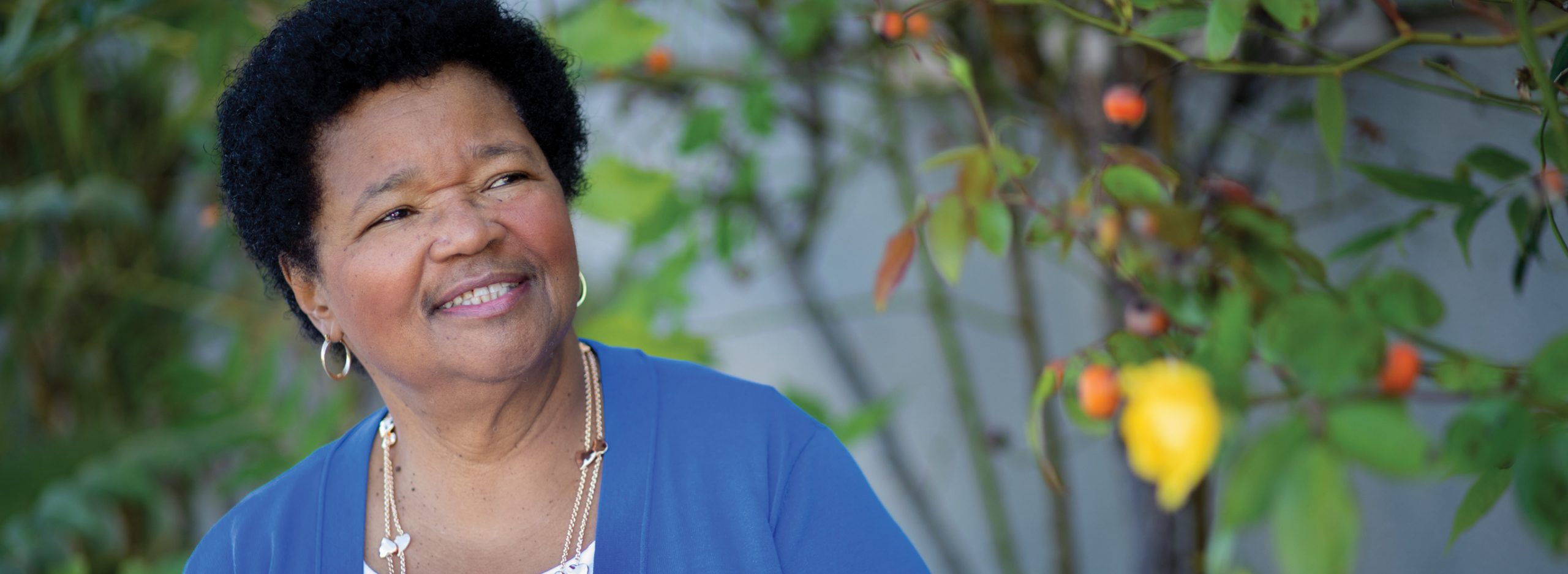Even as she eagerly looks ahead, Phyllis Sharps is making sure she hasn’t missed anything
Written by Steve St. Angelo | Photo by Chris Hartlove
Professor Phyllis Sharps’s career has included 30 years as an Army nurse and 20 years as a Johns Hopkins School of Nursing faculty member. Those 50 years haven’t included much free time. Recently, she’s found herself pondering how she will transition from her academic career to a different phase of life with more adventures and new opportunities. “In all of my career as a nurse, it was not until 2018 that I ever took two weeks of vacation at one time, for a cruise with my husband. It got me to reflecting about what is next.”
Sharps knows that her cruise ship is about to come in, as she looks toward one day soon hanging up the white coat on a brilliant career—serving not only an East Baltimore community that has become home away from her home in Howard County but building programs to keep women and children safe from intimate partner violence across the U.S. Yet, Sharps also knows that the work is not done. As the Elsie M. Lawler Endowed Chair and associate dean for community programs and initiatives, she is determined to build a legacy at Johns Hopkins, in Baltimore, and in communities prone to the burdens of health disparities. Her work is a keystone, her success not an epitaph but a call to do more.
It’s a testament to your work if something you started continues to flourish after you’ve moved on.
So, just as Sharps wasn’t the first to recognize a problem and act, or to recognize the value of mHealth (mobile technology to expand nursing’s reach), she’s determined she won’t be the last. “In the Army, I established a major training program that continued after I left,” she explains of her approach to program building. “It’s a testament to your work if something you started continues to flourish after you’ve moved on.”
Sharps has left no stone unturned, then, as she has worked to turn the Henderson-Hopkins School into a gathering place not just of healthy students but of parents and grandparents who learn wellness from those children. Same with the groundbreaking, National Institute of Nursing Research-funded DOVE (for Domestic Violence Enhanced Home Visitation) program she developed to keep women in abusive or potentially dangerous relationships safe simply by checking in—letting them know they aren’t alone and that they have choices to keep themselves and their children safe. And it has carried through to her work with the Wald Center, providing care to underserved East Baltimore residents, and the House of Ruth Baltimore, shielding and offering a safer path forward to women and children fleeing violence.
Though she knows that in her nursing career she will not see the end of the need among women and children, or of the inequity that plagues residents of East Baltimore, Sharps is not done making a difference. Still, she feels a tug of responsibility in her own family, remembering how her mother sacrificed to help Sharps earn a PhD. “There is a long tradition in my family of mothers and grandmothers helping the daughters reach their professional goals. My mom was there for me. I could not have earned the PhD without her help. Now, it is my turn to help my daughter reach her professional goals” as a physician and program director for a residency training program.
Even as she steals a few moments from a busy schedule to look ahead, Sharps is “grateful for a fabulous career as nurse-researcher.” Call her seasoned. Call her a trailblazer on health equity, on IPV research, or on building bridges to the East Baltimore community. Call her someone who looks forward to volunteering for her church and spending more time with “two beautiful granddaughters.”
And leave it at that. She will let you know she is done on her way out the door.

